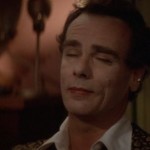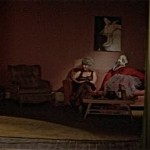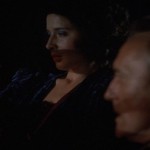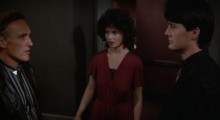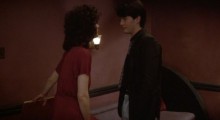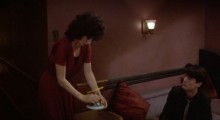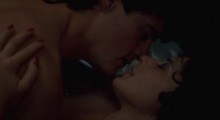The Blue Velvet Project
-
The Blue Velvet Project, #96

Second #4512, 75:12 Dean Stockwell has said that he based his character Ben on a Carol Burnett sketch: “You know that thing that I do with my eyes? Carol Burnett had a character of this super snooty woman and she was always like this. I stole it and I told her one time and she laughed her head off when I told her.” And in an alternate-universe sort of way, this entire sequence at Ben’s is like one of the extended Carol Burnett Show sketches from the mind 1970s, with Harvey Korman and Tim Conway. The awkward pauses, the physical […]
by Nicholas Rombes on Mar 30, 2012 -
The Blue Velvet Project, #95

Second #4465, 74:25 1. Dorothy and Frank split their angles of vision; everyone is watching everyone. But it is Dorothy who suggests and defines the off-screen space, the space where Donny is kept behind a closed door. 2. Ben has just said, to one of the Party Girls, “Darling, could you bring some glasses, and we’ll have a beer with Frank. Please, sit down.” 3. Ben’s quiet formalism is not at all ironic. Rather, his decorum (which Frank calls “suave”) suggests that there is a proper and an improper way to conduct matters of evil in this world, and his […]
by Nicholas Rombes on Mar 28, 2012 -
The Blue Velvet Project, #94

Second #4418, 73:38 At Ben’s, at last. The woman, the doll, and the painting above them—framed by the green (velvet?) curtains—telegraph Frank’s entrance. They are a tightly composed grouping in an open frame, whose curtains anticipate the vaudeville show which is about to unfold, complete with Ben’s lip-synched performance of “In Dreams,” some stock violence, and a running gag that features Jeffrey as the butt of a joke he does not understand. Ben’s apartment is an anarchy of crossed signals and mental jump cuts. The year after Blue Velvet’s release, Robert Coover’s story collection A Night at the Movies, or, […]
by Nicholas Rombes on Mar 26, 2012 -
The Blue Velvet Project, #93

Second #4371, 72:51 As they speed towards Ben’s, Frank’s police radio suddenly bursts forth with sound and Hunter—in the passenger’s seat—picks it up excitedly and says, like a lunatic with a swamp accent, “Po-lice call! Po-lice call!” until Frank snatches the radio from him. It’s perhaps the most slapstick part of the movie, and for a moment there’s the possibility that Frank and his crew are too incompetent to hurt Jeffrey. This is the second time that Frank has uncoiled so quickly (the first happened when he suddenly grabbed Jeffrey in the hallway of Dorothy’s apartment) and within a split […]
by Nicholas Rombes on Mar 23, 2012 -
The Blue Velvet Project, #92

Second #4324, 72:04 Frank’s 1968 Dodge Charger with pop-up headlamps, stretching the screen horizontally as far as it will go. There are three in the front of the car, and three in the back including Jeffrey, who is riding bitch. They are tearing through the night, towards Ben’s, where, in an act of dark magic, Frank will literally disappear from the screen. But before that, there’s the journey that begins with a cut that takes us from the hallway of Dorothy’s apartment to the frame above, at second #4324. The shot breakdown over the next roughly 30 seconds proceeds like […]
by Nicholas Rombes on Mar 21, 2012 -
The Blue Velvet Project, #91

Second #4277, 71:17 1. This is the first time that Frank, Dorothy, and Jeffrey appear together in the same frame. 2. “Oh, you’re from the neighborhood,” Frank says. “You’re a neighbor. Well what’s your name neighbor?” 3. The ratings for “Mister Rogers’ Neighborhood” peaked in 1985, the year before Blue Velvet was released. 4. It’s not only Frank’s eyes that terrify, but his voice, tinged with sarcasm, delivered in Dennis Hopper’s flat, Midwestern accent. And then, buried in the soundtrack, there’s a low, faint rumbling, like the sound of thunder arriving from hundreds of miles away, having crossed vast, empty […]
by Nicholas Rombes on Mar 19, 2012 -
The Blue Velvet Project, #90

Second #4230, 70:30 In Roberto Bolaño’s short story “Days of 1978” (from the collection Last Evenings on Earth) one of the characters, upon hearing the voice of another character, suddenly and frightfully develops an unsettling and inexplicable image in his mind: It [the voice] conjures up a silent black-and-white film in which, all of a sudden, the characters start shouting incomprehensibly at the top of their voices, while a red line appears in the middle of the screen and begins to widen and spread. What to make of this? It’s nightmarish, but why? Perhaps it’s because what’s described is difficult […]
by Nicholas Rombes on Mar 14, 2012 -
The Blue Velvet Project, #89

Second #4183, 69:43 In a passage from his 1952 essay “In Defense of Mixed Cinema,” André Bazin seems to predict the future, a future of watching movies in an age of interruptions and distractions. Bazin writes about watching Les Vampires (Louise Feuillade, 1915) during a night full of technical mishaps: That night only one of the two projectors was working. In addition, the print had no subtitles and I imagine that Feuillade would have had difficulty in trying to recognize the murderers. It was even money as to which were the good guys and which the bad. So difficult was […]
by Nicholas Rombes on Mar 12, 2012 -
The Blue Velvet Project, #88

Second #4136, 68:56 After Jeffrey strikes Dorothy, a roar of flames fills the frame. The barely repressed brute logic of the film finally explodes on the screen, as Jeffrey has, at last, become a surrogate Frank. What’s remarkable about the scene is how it’s fashioned from some pretty regressive clichés about abuse, especially in how Dorothy literally “asks for it.” On one level, Blue Velvet’s depiction of women is deformed in the worst possible ways, as it balances Sandy as the objectified virginal “good” girl, full of nurturing love, and Dorothy as the madwoman whore. There’s nothing in between, and […]
by Nicholas Rombes on Mar 9, 2012 -
The Blue Velvet Project, #87

Second #4089, 68:09 1. Dorothy to Jeffrey: “Do you want to do bad things? / Anything . . . anything. / I want you to hurt me.” 2. Ralph Waldo Emerson, from Experience (1844): It is very unhappy, but too late to be helped, the discovery we have made that we exist. . . . Ever afterwards we suspect our instruments. We have learned that we do not see directly, but mediately, and that we have no means of correcting these colored and distorting lenses which we are, or of computing the amount of their errors. Perhaps these subject-lenses have […]
by Nicholas Rombes on Mar 7, 2012
